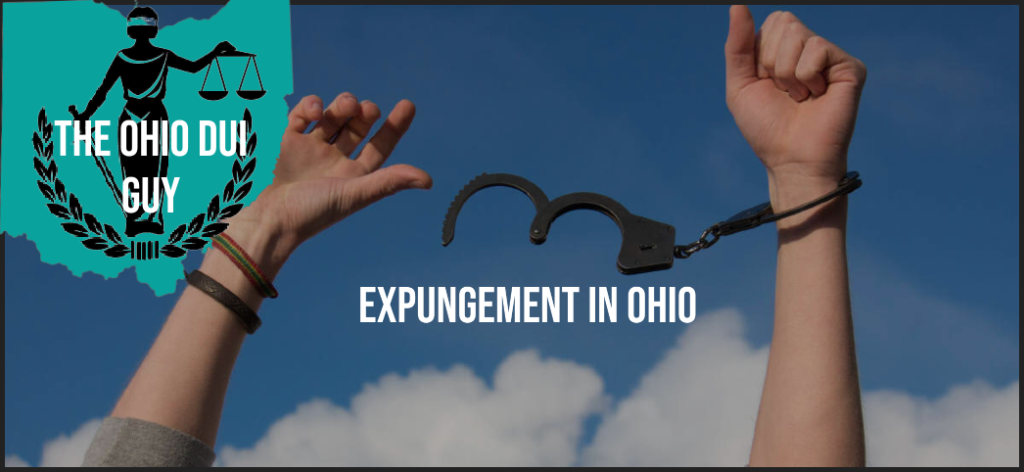What is a Criminal Expungement and What are the Requirements in Ohio

Can a Ohio DUI Attorney help you get a OVI / DUI Conviction Expunged?
Before we begin, let’s address one topic first. The question of whether an Ohio DUI or OVI conviction can be expunged.
The awnser is No! If a person is convicted of OVI (ORC 4511.19) or having physical control of a vehicle while under the influence in Ohio can not be expunged.
Now that we have gotten that out of the way, let’s move on to discuss criminal convictions that are expungable and those that are not, as well as the reasons why someone should consider expunging their record.
A criminal record can permanently harm your chances of finding employment, getting a student loan, or purchasing a new home. In the current economic climate, it is more crucial than ever to have one’s criminal record expunged in order to present a clean slate to potential lenders and employers.
Anyone interested enough to look may be able to find out about your criminal history thanks to the Internet. Computerized record-checking systems facilitate the rapid discovery of your criminal history by lenders, landlords, and employers.
When Is It Possible to File for Expungement?
Before submitting an application for expungement, a person must wait a specific amount of time under Ohio expungement law. The term “expungement waiting period” is frequently used to describe this time frame.
Depending on the type of conviction or how the case is handled, a person may have to wait a certain amount of time before they can apply for an expungement. Additionally, the waiting period for an expungement doesn’t start until the case is finally discharged or terminated.
Generally speaking, a person is not completely released until they have fulfilled all of the requirements of the court, paid their fines and/or restitution, served the full length of the sentence, and cleared any probation.
Many courts record the precise date the case was dismissed in their dockets after a party has fulfilled these requirements. Thus, on the date of termination or the final fulfillment of court sanctions, the expungement waiting period starts.
Here is a list of the case’s disposition or type of conviction along with the length of time that Ohio law requires for expungement.
Expungement of a conviction for a felony
When convicted of a felony offense, an eligible offender has three years from the end of their case to request that the sentencing court expunge their conviction and seal their record.
Misdemeanor Conviction Expungement
If an eligible offender is found guilty of a misdemeanor, they have one year from the end of their case to request that the sentencing court expunge their conviction and seal their record.
An individual may request the expungement and sealing of his record right away if a charge against him was dropped. To request that a dismissed charge be expunged, there is no waiting period.
An expungement can be applied for right away if the defendant was found not guilty at the end of the trial. For an acquitted charge, there is no waiting period before filing an expungement.
An application for expungement may be submitted at any point after the two-year period that has passed since the grand jury informed the court that there was no bill for a charge against an individual (a decision not to indict a person charged with an offense).
The court where the misdemeanor criminal case was filed may receive an application from anyone who has been arrested for a misdemeanor offense and has caused bail forfeiture that is still pending at any point after a year has passed since the date the bail forfeiture was entered.
First, it’s critical to understand that, for the purposes of expungement and sealing actions, two or three convictions from the same case will be regarded as a single conviction.
Until he or she is able to apply to the court and have all of the records in the cases pertaining to those charges expunged and sealed, a person who is charged with two or more offenses for the same act and at least one of the charges has a final disposition that differs from the final disposition of the other charges cannot apply for the expungement and sealing of his record in any of the cases.
The new Ohio Expungement Law, which was passed in September 2014 under OH SB143, makes an exception to this rule. Now, if the court determines that the records pertaining to all the charges would be eligible for expungement under the Not Guilty/Dismissal/No Bill expungement law (2953.52).
In the absence of that conviction, and if the final disposition of one and only one of the charges is an otherwise unsealable conviction for a motor vehicle offense other than OVI (ORC 4511.19) or having physical control of a vehicle while under the influence (ORC 4511.194), records pertaining to all the charges may be sealed.
In this situation, the court cannot mandate that only a subset of the records be sealed or expunged. (This change means that even a traffic infraction will be expunged and sealed as part of the expungement case when a person has a Not Guilty, Dismissal, or No Bill record expunged out of a case in which they also had a traffic offense.) (ORC 2953.61). Consequently, the associated traffic charge would be expunged along with the criminal record that is Not Guilty, Dismissed, or No Bill.
Convictions listed below cannot be expunged:
- Convictions in which the offender faces a mandatory prison sentence
- Convictions for sexual offenses under §§ 2907.02, 2907.03, 2907.04, 2907.05, 2907.06, 2907.321, 2907.322, or 2907.323, as well as previous 2907.12
- Convictions for violent crimes that are either felonies (apart from assault and a few others) or first-degree misdemeanors
- Convictions for first- or second degree felonies
- Violations of Chapters 4507., 4510., 4511., or 4549 pertaining to traffic offenses like speeding, OVI, or reckless operation.
- Convictions under 2907.07 (importuning) or comparable local laws when the victim is younger than 18 that occur on or after October 10, 2007
- Other sexual offenses in which the victim was younger than sixteen
- forfeiture of bail in specific traffic cases
- more than one conviction for the same offense
Have can an experienced Ohio DUI attorney help?
If your situation is not covered here contact us for free consultation for expungement cases in Ohio. To find out how we can assist you in exploring the process, get in touch with our expungement team right now.
